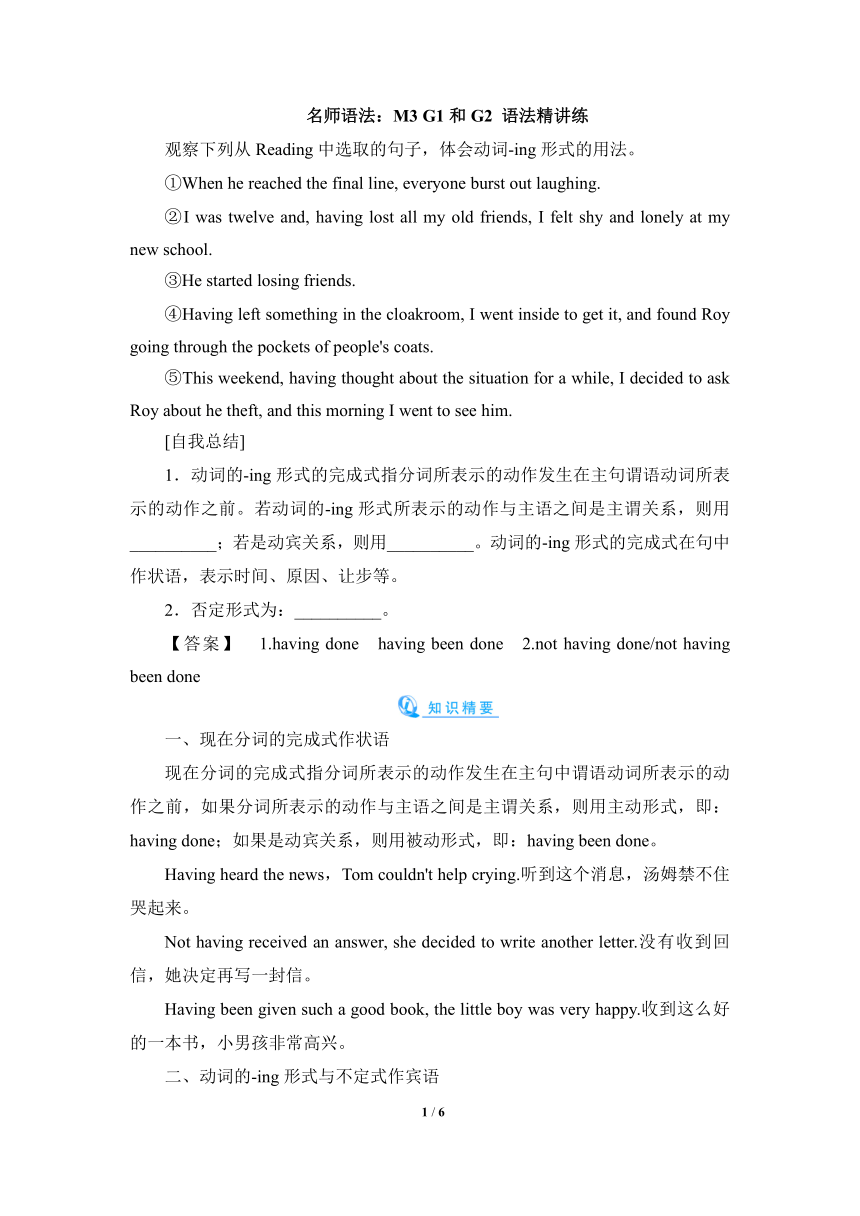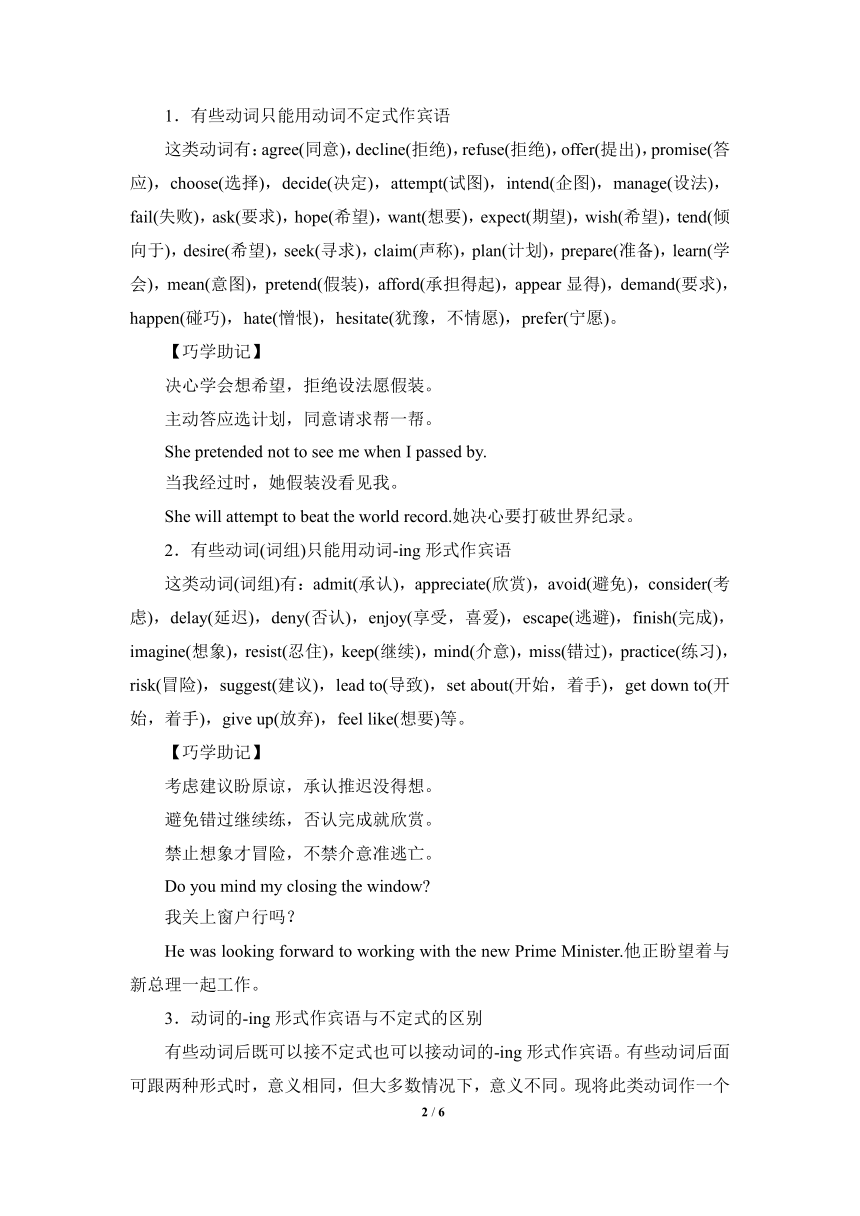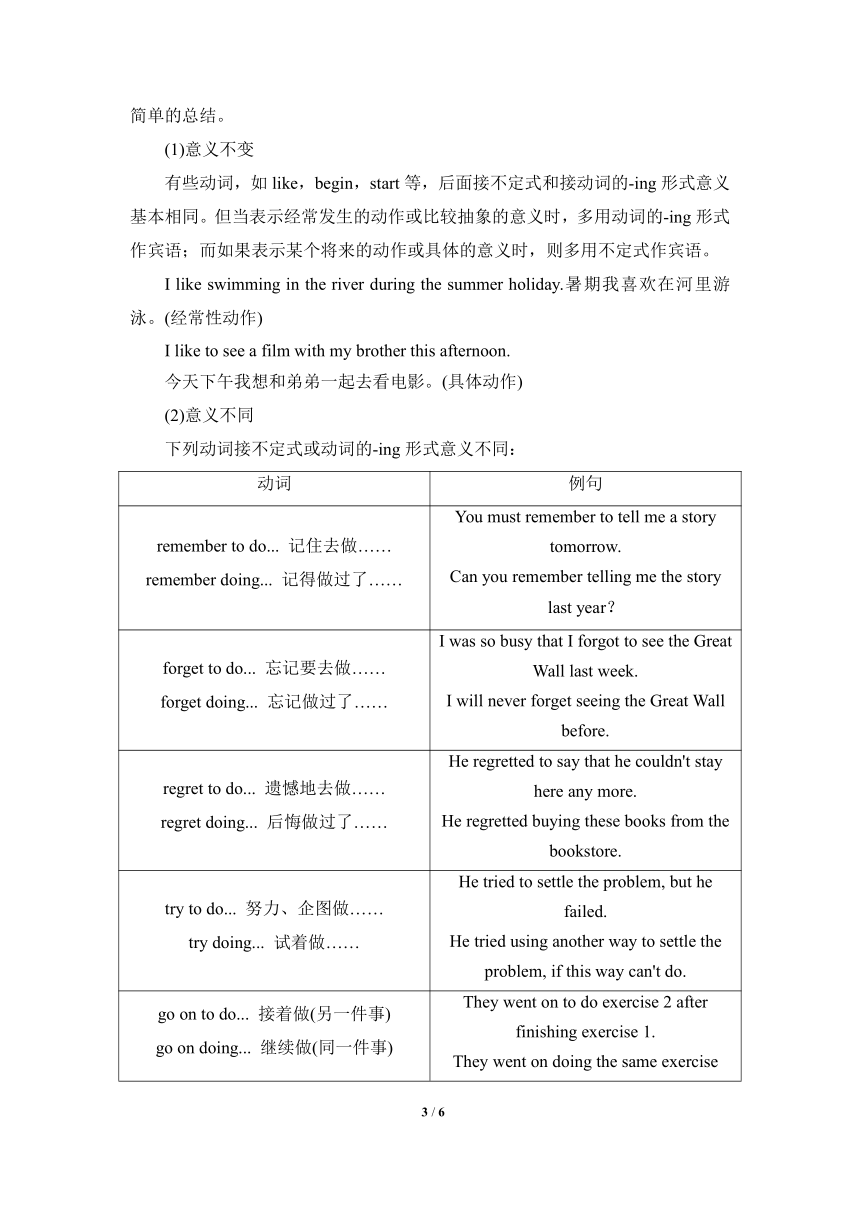外研版选修6 Module 3 Interpersonal Relationships -- Friendship学案名师语法:M3 G1和G2 语法精讲练(有答案)
文档属性
| 名称 | 外研版选修6 Module 3 Interpersonal Relationships -- Friendship学案名师语法:M3 G1和G2 语法精讲练(有答案) |

|
|
| 格式 | doc | ||
| 文件大小 | 63.0KB | ||
| 资源类型 | 教案 | ||
| 版本资源 | 外研版 | ||
| 科目 | 英语 | ||
| 更新时间 | 2023-02-18 09:19:24 | ||
图片预览



文档简介
名师语法:M3 G1和G2 语法精讲练
观察下列从Reading中选取的句子,体会动词 ing形式的用法。
①When he reached the final line, everyone burst out laughing.
②I was twelve and, having lost all my old friends, I felt shy and lonely at my new school.
③He started losing friends.
④Having left something in the cloakroom, I went inside to get it, and found Roy going through the pockets of people's coats.
⑤This weekend, having thought about the situation for a while, I decided to ask Roy about he theft, and this morning I went to see him.
[自我总结]
1.动词的 ing形式的完成式指分词所表示的动作发生在主句谓语动词所表示的动作之前。若动词的 ing形式所表示的动作与主语之间是主谓关系,则用__________;若是动宾关系,则用__________。动词的 ing形式的完成式在句中作状语,表示时间、原因、让步等。
2.否定形式为:__________。
【答案】 1.having done having been done 2.not having done/not having been done
一、现在分词的完成式作状语
现在分词的完成式指分词所表示的动作发生在主句中谓语动词所表示的动作之前,如果分词所表示的动作与主语之间是主谓关系,则用主动形式,即:having done;如果是动宾关系,则用被动形式,即:having been done。
Having heard the news,Tom couldn't help crying.听到这个消息,汤姆禁不住哭起来。
Not having received an answer, she decided to write another letter.没有收到回信,她决定再写一封信。
Having been given such a good book, the little boy was very happy.收到这么好的一本书,小男孩非常高兴。
二、动词的 ing形式与不定式作宾语
1.有些动词只能用动词不定式作宾语
这类动词有:agree(同意),decline(拒绝),refuse(拒绝),offer(提出),promise(答应),choose(选择),decide(决定),attempt(试图),intend(企图),manage(设法),fail(失败),ask(要求),hope(希望),want(想要),expect(期望),wish(希望),tend(倾向于),desire(希望),seek(寻求),claim(声称),plan(计划),prepare(准备),learn(学会),mean(意图),pretend(假装),afford(承担得起),appear显得),demand(要求),happen(碰巧),hate(憎恨),hesitate(犹豫,不情愿),prefer(宁愿)。
【巧学助记】
决心学会想希望,拒绝设法愿假装。
主动答应选计划,同意请求帮一帮。
She pretended not to see me when I passed by.
当我经过时,她假装没看见我。
She will attempt to beat the world record.她决心要打破世界纪录。
2.有些动词(词组)只能用动词 ing形式作宾语
这类动词(词组)有:admit(承认),appreciate(欣赏),avoid(避免),consider(考虑),delay(延迟),deny(否认),enjoy(享受,喜爱),escape(逃避),finish(完成),imagine(想象),resist(忍住),keep(继续),mind(介意),miss(错过),practice(练习),risk(冒险),suggest(建议),lead to(导致),set about(开始,着手),get down to(开始,着手),give up(放弃),feel like(想要)等。
【巧学助记】
考虑建议盼原谅,承认推迟没得想。
避免错过继续练,否认完成就欣赏。
禁止想象才冒险,不禁介意准逃亡。
Do you mind my closing the window
我关上窗户行吗?
He was looking forward to working with the new Prime Minister.他正盼望着与新总理一起工作。
3.动词的 ing形式作宾语与不定式的区别
有些动词后既可以接不定式也可以接动词的 ing形式作宾语。有些动词后面可跟两种形式时,意义相同,但大多数情况下,意义不同。现将此类动词作一个简单的总结。
(1)意义不变
有些动词,如like,begin,start等,后面接不定式和接动词的 ing形式意义基本相同。但当表示经常发生的动作或比较抽象的意义时,多用动词的 ing形式作宾语;而如果表示某个将来的动作或具体的意义时,则多用不定式作宾语。
I like swimming in the river during the summer holiday.暑期我喜欢在河里游泳。(经常性动作)
I like to see a film with my brother this afternoon.
今天下午我想和弟弟一起去看电影。(具体动作)
(2)意义不同
下列动词接不定式或动词的 ing形式意义不同:
动词 例句
remember to do... 记住去做……remember doing... 记得做过了…… You must remember to tell me a story tomorrow.Can you remember telling me the story last year?
forget to do... 忘记要去做……forget doing... 忘记做过了…… I was so busy that I forgot to see the Great Wall last week.I will never forget seeing the Great Wall before.
regret to do... 遗憾地去做……regret doing... 后悔做过了…… He regretted to say that he couldn't stay here any more.He regretted buying these books from the bookstore.
try to do... 努力、企图做……try doing... 试着做…… He tried to settle the problem, but he failed.He tried using another way to settle the problem, if this way can't do.
go on to do... 接着做(另一件事)go on doing... 继续做(同一件事) They went on to do exercise 2 after finishing exercise 1.They went on doing the same exercise after a short rest.
can't help to do... 不能帮助做……can't help doing... 禁不住去做…… I couldn't help to finish the work because I was so busy.I couldn't help finishing the work when I saw he was too tired.
stop to do... 停下来去做……stop doing... 停止做…… They stopped to talk after class was over.They stopped talking after class began.
mean to do... 想要做……mean doing... 意味着做…… He means to go to university, but going to university means working very, very hard.
sb.need/want/require to do... 某人需要/想要/要求做某事sth.need/want/require doing... 某事需要/想要/要求被做 He needs to look after his mother because she is old.He is so young that he needs looking after( = to be looked after) .
learn to do... 学会了……learn doing...开始学习… Having learned to skate skillfully, she went on to learn swimming in the river.
only to do... 结果,不料……(出人预料)only doing... 结果只是……(必然会) His mother went home, (only) to find the door open and everything stolen.His poor father died, only leaving him 3 broken houses.
Ⅰ.单项填空
1.(2012·湖南高考)We've had a good start,but next,more work needs ________ to achieve the final success.
A.being done B.do C.to be done D.to do
【解析】 句意:我们已经有了一个好的开始,不过要实现最后的成功接下来还有很多工作要做。根据needs为第三人称单数形式可知此处need为实义动词,故其后不能直接跟动词原形,排除B项;后一个句子的主语more work与do之间为被动关系,排除D项。表达“某物需要被……”时,我们可以用动词不定式的被动语态或动名词的主动语态,即此处可用to be done或doing作宾语。
【答案】 C
2.(2012·北京高考)One learns a language by making mistakes and ________ them.
A.corrects B.correct
C.to correct D.correcting
【解析】 句意:人通过出错并改正错误来学习语言。by doing通过某种方式,correct与make为并列关系,同为by的宾语,故选D。
【答案】 D
3.(2012·安徽高考)I remembered ________ the door before I left the office, but forgot to turn off the lights.
A.locking B.to lock
C.having locked D.to have locked
【解析】 形式上来看,这道题在考查非谓语动词的用法辨析。不定时和动名词的基本辨析是:动词不定式表示未发生或具体要做的动作,动名词则表示发生过或习惯性的动作。为了更清晰地让学生记住此辨析,在翻译时可用“要”字表示不定式,用“了/过”字表示动名词。那么,remember to do sth. 就翻译为“记得要做某事”,而remember doing sth. 则翻译成“记得做了/过某事”。因此,本题题干使用不定式和动名词时的意思分别是:动词不定式:在我离开办公室之前,我记得要锁门,但是却忘了要关灯。动名词:在我离开办公室之前,我记得锁了门,但是却忘了要关灯。显然,使用动名词,本句在逻辑上就不通顺了。因此,只有动词不定式才是正确的选项。既然是要做某事,就不能使用完成结构。
【答案】 B
4.(2013·江苏高考)Lionel Messi, ________the record for the most goals in a calendar year, is considered the most talented football player in Europe.
A.set B.setting
C.to set D.having set
【解析】 考查非谓语动词。首先判断该句谓语为is considered,故可知横线部分为非谓语动词,描述主语Lionel Messi。短语set the record与主语之间为主动关系,创纪录这一动作在is considered之前已经发生并对现在产生影响。故选D。
【答案】 D
5.(2013·新课标全国卷Ⅱ)I got to the office earlier that day, ________the 7:30 train from Paddington.
A.caught B.to have caught
C.to catch D.having caught
【解析】 考查非谓语动词。根据句意,因为我赶上了7:30的车,所以那天我更早地到了办公室,可知赶车发生在到办公室之前,且与主语I之间为主动关系,故使用现在分词完成式表主动完成。
【答案】 D
Ⅱ.用所给词的适当形式填空
1.They refused________ (accept) my suggestion.
2.She suggested ________ ( spend) another week in the country.
3.When did you begin ________ (learn) French
4.I don't like ________ (play) basketball, but I like ________ (play) basketball just the moment.
5.I remembered ________ (post) the letter this morning.
6.I regret ________ (inform) you that you won't be able to attend the class.
7.Failing this exam means ________ (wait) for a year.
8.Let's try________ (do) the work in this way.
9.________ (leave) something in the cloakroom, I went inside to get it.
10.________ (lose) all my friends, I felt very shy and lonely in my new school.
【答案】 1.to accept 2.spending 3.learning /to learn
4.playing; to play 5.posting 6.to inform 7.waiting
8.doing 9.Having left 10.Having lost
PAGE
1 / 6
观察下列从Reading中选取的句子,体会动词 ing形式的用法。
①When he reached the final line, everyone burst out laughing.
②I was twelve and, having lost all my old friends, I felt shy and lonely at my new school.
③He started losing friends.
④Having left something in the cloakroom, I went inside to get it, and found Roy going through the pockets of people's coats.
⑤This weekend, having thought about the situation for a while, I decided to ask Roy about he theft, and this morning I went to see him.
[自我总结]
1.动词的 ing形式的完成式指分词所表示的动作发生在主句谓语动词所表示的动作之前。若动词的 ing形式所表示的动作与主语之间是主谓关系,则用__________;若是动宾关系,则用__________。动词的 ing形式的完成式在句中作状语,表示时间、原因、让步等。
2.否定形式为:__________。
【答案】 1.having done having been done 2.not having done/not having been done
一、现在分词的完成式作状语
现在分词的完成式指分词所表示的动作发生在主句中谓语动词所表示的动作之前,如果分词所表示的动作与主语之间是主谓关系,则用主动形式,即:having done;如果是动宾关系,则用被动形式,即:having been done。
Having heard the news,Tom couldn't help crying.听到这个消息,汤姆禁不住哭起来。
Not having received an answer, she decided to write another letter.没有收到回信,她决定再写一封信。
Having been given such a good book, the little boy was very happy.收到这么好的一本书,小男孩非常高兴。
二、动词的 ing形式与不定式作宾语
1.有些动词只能用动词不定式作宾语
这类动词有:agree(同意),decline(拒绝),refuse(拒绝),offer(提出),promise(答应),choose(选择),decide(决定),attempt(试图),intend(企图),manage(设法),fail(失败),ask(要求),hope(希望),want(想要),expect(期望),wish(希望),tend(倾向于),desire(希望),seek(寻求),claim(声称),plan(计划),prepare(准备),learn(学会),mean(意图),pretend(假装),afford(承担得起),appear显得),demand(要求),happen(碰巧),hate(憎恨),hesitate(犹豫,不情愿),prefer(宁愿)。
【巧学助记】
决心学会想希望,拒绝设法愿假装。
主动答应选计划,同意请求帮一帮。
She pretended not to see me when I passed by.
当我经过时,她假装没看见我。
She will attempt to beat the world record.她决心要打破世界纪录。
2.有些动词(词组)只能用动词 ing形式作宾语
这类动词(词组)有:admit(承认),appreciate(欣赏),avoid(避免),consider(考虑),delay(延迟),deny(否认),enjoy(享受,喜爱),escape(逃避),finish(完成),imagine(想象),resist(忍住),keep(继续),mind(介意),miss(错过),practice(练习),risk(冒险),suggest(建议),lead to(导致),set about(开始,着手),get down to(开始,着手),give up(放弃),feel like(想要)等。
【巧学助记】
考虑建议盼原谅,承认推迟没得想。
避免错过继续练,否认完成就欣赏。
禁止想象才冒险,不禁介意准逃亡。
Do you mind my closing the window
我关上窗户行吗?
He was looking forward to working with the new Prime Minister.他正盼望着与新总理一起工作。
3.动词的 ing形式作宾语与不定式的区别
有些动词后既可以接不定式也可以接动词的 ing形式作宾语。有些动词后面可跟两种形式时,意义相同,但大多数情况下,意义不同。现将此类动词作一个简单的总结。
(1)意义不变
有些动词,如like,begin,start等,后面接不定式和接动词的 ing形式意义基本相同。但当表示经常发生的动作或比较抽象的意义时,多用动词的 ing形式作宾语;而如果表示某个将来的动作或具体的意义时,则多用不定式作宾语。
I like swimming in the river during the summer holiday.暑期我喜欢在河里游泳。(经常性动作)
I like to see a film with my brother this afternoon.
今天下午我想和弟弟一起去看电影。(具体动作)
(2)意义不同
下列动词接不定式或动词的 ing形式意义不同:
动词 例句
remember to do... 记住去做……remember doing... 记得做过了…… You must remember to tell me a story tomorrow.Can you remember telling me the story last year?
forget to do... 忘记要去做……forget doing... 忘记做过了…… I was so busy that I forgot to see the Great Wall last week.I will never forget seeing the Great Wall before.
regret to do... 遗憾地去做……regret doing... 后悔做过了…… He regretted to say that he couldn't stay here any more.He regretted buying these books from the bookstore.
try to do... 努力、企图做……try doing... 试着做…… He tried to settle the problem, but he failed.He tried using another way to settle the problem, if this way can't do.
go on to do... 接着做(另一件事)go on doing... 继续做(同一件事) They went on to do exercise 2 after finishing exercise 1.They went on doing the same exercise after a short rest.
can't help to do... 不能帮助做……can't help doing... 禁不住去做…… I couldn't help to finish the work because I was so busy.I couldn't help finishing the work when I saw he was too tired.
stop to do... 停下来去做……stop doing... 停止做…… They stopped to talk after class was over.They stopped talking after class began.
mean to do... 想要做……mean doing... 意味着做…… He means to go to university, but going to university means working very, very hard.
sb.need/want/require to do... 某人需要/想要/要求做某事sth.need/want/require doing... 某事需要/想要/要求被做 He needs to look after his mother because she is old.He is so young that he needs looking after( = to be looked after) .
learn to do... 学会了……learn doing...开始学习… Having learned to skate skillfully, she went on to learn swimming in the river.
only to do... 结果,不料……(出人预料)only doing... 结果只是……(必然会) His mother went home, (only) to find the door open and everything stolen.His poor father died, only leaving him 3 broken houses.
Ⅰ.单项填空
1.(2012·湖南高考)We've had a good start,but next,more work needs ________ to achieve the final success.
A.being done B.do C.to be done D.to do
【解析】 句意:我们已经有了一个好的开始,不过要实现最后的成功接下来还有很多工作要做。根据needs为第三人称单数形式可知此处need为实义动词,故其后不能直接跟动词原形,排除B项;后一个句子的主语more work与do之间为被动关系,排除D项。表达“某物需要被……”时,我们可以用动词不定式的被动语态或动名词的主动语态,即此处可用to be done或doing作宾语。
【答案】 C
2.(2012·北京高考)One learns a language by making mistakes and ________ them.
A.corrects B.correct
C.to correct D.correcting
【解析】 句意:人通过出错并改正错误来学习语言。by doing通过某种方式,correct与make为并列关系,同为by的宾语,故选D。
【答案】 D
3.(2012·安徽高考)I remembered ________ the door before I left the office, but forgot to turn off the lights.
A.locking B.to lock
C.having locked D.to have locked
【解析】 形式上来看,这道题在考查非谓语动词的用法辨析。不定时和动名词的基本辨析是:动词不定式表示未发生或具体要做的动作,动名词则表示发生过或习惯性的动作。为了更清晰地让学生记住此辨析,在翻译时可用“要”字表示不定式,用“了/过”字表示动名词。那么,remember to do sth. 就翻译为“记得要做某事”,而remember doing sth. 则翻译成“记得做了/过某事”。因此,本题题干使用不定式和动名词时的意思分别是:动词不定式:在我离开办公室之前,我记得要锁门,但是却忘了要关灯。动名词:在我离开办公室之前,我记得锁了门,但是却忘了要关灯。显然,使用动名词,本句在逻辑上就不通顺了。因此,只有动词不定式才是正确的选项。既然是要做某事,就不能使用完成结构。
【答案】 B
4.(2013·江苏高考)Lionel Messi, ________the record for the most goals in a calendar year, is considered the most talented football player in Europe.
A.set B.setting
C.to set D.having set
【解析】 考查非谓语动词。首先判断该句谓语为is considered,故可知横线部分为非谓语动词,描述主语Lionel Messi。短语set the record与主语之间为主动关系,创纪录这一动作在is considered之前已经发生并对现在产生影响。故选D。
【答案】 D
5.(2013·新课标全国卷Ⅱ)I got to the office earlier that day, ________the 7:30 train from Paddington.
A.caught B.to have caught
C.to catch D.having caught
【解析】 考查非谓语动词。根据句意,因为我赶上了7:30的车,所以那天我更早地到了办公室,可知赶车发生在到办公室之前,且与主语I之间为主动关系,故使用现在分词完成式表主动完成。
【答案】 D
Ⅱ.用所给词的适当形式填空
1.They refused________ (accept) my suggestion.
2.She suggested ________ ( spend) another week in the country.
3.When did you begin ________ (learn) French
4.I don't like ________ (play) basketball, but I like ________ (play) basketball just the moment.
5.I remembered ________ (post) the letter this morning.
6.I regret ________ (inform) you that you won't be able to attend the class.
7.Failing this exam means ________ (wait) for a year.
8.Let's try________ (do) the work in this way.
9.________ (leave) something in the cloakroom, I went inside to get it.
10.________ (lose) all my friends, I felt very shy and lonely in my new school.
【答案】 1.to accept 2.spending 3.learning /to learn
4.playing; to play 5.posting 6.to inform 7.waiting
8.doing 9.Having left 10.Having lost
PAGE
1 / 6
